Turkey's president defeated secular challenger Kemal Kilicdaroglu in the second round of voting on Sunday.
President Recep Tayyip Erdogan will rule until 2028 after winning last night's Turkish presidential election.
 ADVERTISEMENT
ADVERTISEMENT
 ADVERTISEMENT
ADVERTISEMENT
He defeated rival Kemal Kilicdaroglu in the second round of voting, after coming just short of an outright victory first time around on 14 May.
Erdogan secured more than 52% of the vote, though the results have split the nation.
In two bullish victory speeches, the 69-year-old thanked voters for entrusting him with power again and called for unity.
However, he soon targeted political foes, such as challenger Kemal Kilicdaroglu, jailed Kurdish leader Selahattin Demirtas and the LGBT community.
Secular rival Kilicdaroglu said the election was “the most unjust ever,” claiming Erdogan had mobilised all state resources and the media he controls against him.
“We will continue to be at the forefront of this struggle until real democracy comes to our country,” he said in Ankara.

 ${title}
${title}
Live ended
Elections 'turning point in history', says Erdogan
Monday marks the 570th anniversary of the Ottoman Empire capturing Istanbul, then Constantinople.
Referring to this event, Erdogan says: "That was a turning point in history, closed a century and opened a new one."
"I hope these elections will be such a turning point in history.”
His victory speech finishes with a poem.
Million more Syrian refugees will return - Erdogan
Erdogan's address to supporters has moved onto Syrian refugees, a hot topic in the run-up to the election.
"We have so far ensured the voluntary return of nearly 600 thousand migrants to the safe zones in Syrian territory," he said.
"With a new project, we will ensure the return of one million more people in a few years. we need to fulfil the demand of our citizens on this issue."
Turkey, which borders Syria in the southeast, hosts 3.4 million Syrians who have fled the war.
Erdogan's rival Kemal Kilicdaroglu promised to deport all the refugees back to Syria, if he was elected.
Erdogan: Tackling inflation a 'priority'
"Now that the elections are over, we will allocate all our time and energy to work," said the Turkish president during a speech to supporters.
"Overcoming the problems arising from inflation is one of our priorities," he continued. "As the interest rate has come down, inflation will also come down."
Inflation surged to above 85% last year, hitting Erdogan's popularity hard.
'Turkey won', says Erdogan
The newly-elected Turkish president has said his win is a victory for the country, while urging supporters "to unite and get together".
Speaking at his palace in Ankara, he told the crowd: “You gave this duty to us again, we will build the century of Turkey together."
“In one of the most important elections in Turkish history, our nation chose the century of Turkey."
Turkey will celebrate the 100th anniversary of the founding of the modern Turkish Republic this year.
"It is not just us who won, Turkey won," he added.
What Erdogan's re-election means for Turkey and the West?
The consequences of his victory over secular rival Kemal Kilicdaroglu] will reverberate across Turkey and the world.
Read more here.
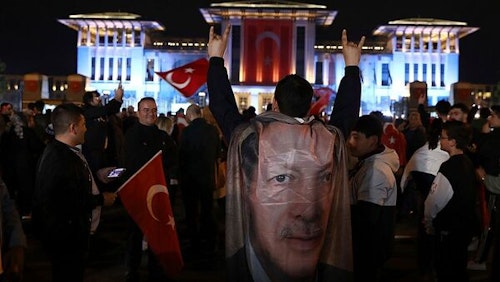
Strong voter turnout
More than 85% of the Turkish electorate turned out to vote on Sunday, higher than the average in many European countries.
Around 52,000,000 votes were cast, putting turnout at 85.71%.
In the 2022 French Presidential Election 74% of the electorate cast votes. Meanwhile, in the 2019 UK General Election 67% of those eligible to vote did so.
Zelenskyy wants to deepen coperation with Erdogan
Ukrainian President Volodymyr Zelenskyy has congratulated his Turkish counterpart for winning, expressing a desire to work together in the areas of "security and stability".
"I congratulate President @RTErdogan for his victory in the presidential elections," he wrote on Twitter Sunday evening.
"We hope to develop our cooperation for the security and stability of Europe and further strengthen our strategic partnership for the benefit of our countries."
Erdogan declared champion by election council
"Based on the provisional results, it has been found that Mr. Recep Tayyip Erdogan has been re-elected President of the Republic," said the chairman of the Turkish High Electoral Committee (YSK), Ahmet Yener.
He was quoted as saying this by the government-controlled Anadolu Agency news agency.
The result is still not yet official, with 99.85% of the votes counted, according to Anadolu.
First reactions from EU
The President of the European Council has congratulated Erdogan on his victory.
"I look forward to working with you again to deepen EU-Turkey relations in the years to come," Charles Michel wrote on Twitter.
Turkey's long-running EU accession negotiations stalled in 2016. The pair have quarrelled in the past over Ankara's human rights violations, issues with the rule of law and the migration crisis.
Authoritarian leaders congratulate Erdogan
Some authoritarian leaders from around the world have praised the Turkish president's victory.
Russian President Vladimir Putin congratulated President Recep Tayyip Erdogan on his election success, with the two countries having got closer in recent years.
Meanwhile, Iran's President Ebrahim Raisi also praised his Turkish counterpart, calling the result a sign of the Turkish people's continued trust in him.
Turnout in the 2021 Iranian presidential election was 48.5%, the lowest turnout in Iranian electoral history, with few Iranians satisfied with the candidates on offer. It also had the highest share of spoiled or invalid ballots at around 13%.
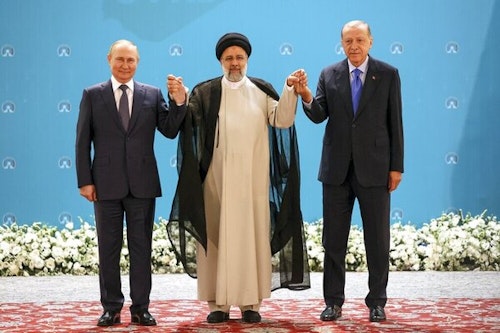
Opposition leader vows to continue the 'struggle'
Kemal Kilicdaroglu, head of the CHP, has promised to carry on opposing Erdogan, after his defeat in the second round of Turkey's presidential election.
"I could not be silent when millions of immigrants came and you became second-class citizens. I could not be silent when people were unemployed," he said on Sunday night. "I have always fought for your rights and I will continue to do so."
The secular challenger had pledged to deport all of the 3.4 million Syrian refugees living in Turkey, if elected.
"I have a request from you, support the struggle for democracy," he continued. "We have experienced the most unfair election in recent years. All the facilities of the state were given to one man."
"In this election, the will of the people to change an authoritarian administration has emerged. The Republican People's Party is fighting with all its elements. We will continue this struggle until democracy is restored."
Kilicdaroglu also thanks all the country's "women and young people", calling them the "heroes of democracy".
Some 5.2 million young Turks were eligible to vote for the first time in this year's elections.
What's on Erdogan's agenda?
The Turkish president will face many challenges over his next five-year rule.
The economy is gripped by turmoil and there are reportedly sharp divisions in his AK party around future policy directions.
Fight against inflation
More than a priority, it will be an emergency to relieve sky-high inflation. Annual inflation was 43.68% in April, according to the Turkish Statistical Insitute.
The cost of living crisis has battered households, with more than two-thirds of people in Turkey struggling to pay for food and cover their rent, found to a survey by the Yöneylem Social Research Centre last August.
Post-earthquake reconstruction
The 7.8 magnitude earthquake on 6 February devastated entire areas of southeastern Turkey, killing at least 50,000 people and displacing more than three million.
Erdogan has promised to rebuild 650,000 homes in the affected provinces as soon as possible.
Sweden's entry into NATO
Turkey's NATO allies are waiting for Ankara to lift its veto on Sweden's entry into the US-led alliance, blocked since May 2022.
While Stockholm has multiplied goodwill gestures, Erdogan has dug his heels in, demanding the extradition of Kurds he calls "terrorists" and political rivals, who have criticised him in the past.
Reconciliation with Syria
Recep Tayyip Erdogan has tried in recent months to get closer to his neighbour, Syrian President Bashar al-Assad, but his attempts have not succeeded, despite Russian mediation.
Assad wants Turkish forces stationed in northern Syria to withdraw and for Ankara to end its support of rebel groups opposed to Damascus.
Turkey, for its part, is home to 3.4 million Syrian refugees who fled the war. Erdogan announced in May the construction of 200,000 homes in northern Syria to allow for refugees to "voluntarily" return home.
'Everything will become better', claims Erdogan fan
“I expect everything to become better,” said Nisa, 28, a veiled woman wearing a headband with Erdogan’s name, told AFP on Sunday.
Another supporter of the president said Turkey would get stronger with him in office for five more years.
“There are issues, problems in every country around the world, in European countries as well... With strong leadership we will overcome Turkey’s problems as well,” said 39-year-old Mert, who had come to celebrate with his son.
Bugra Oztug, 24, who voted for opposition candidate Kilicdaroglu, said she was not surprised at the result, blaming failings of the opposition.
“I feel sad and disappointed but I am not hopeless. I still think there are people who can see the realities and truth,” Oztug said.
(AFP)
Erdogan - a force to be reckoned with
Results are still yet to be confirmed, but it looks likely that Erdogan has won the second round of the Turkish presidential election.
The desire for change from some of the electorate, an economy on the rocks, rampant inflation, mounting authoritarianism and rollback of democratic freedoms - none of this has outweighed people's desire for security and stability.
Not even the consequences of a terrible earthquake in February, which left at least 50,000 people dead, have toppled Turkey's head of state.
Critics may say the vote was not fair for starters. Having been in power for decades, Erdogan could marshall all the state apparatus and government-controlled media he had at his disposal.
Whatever the case, Erdogan, it seems, is here to stay.
(AFP)
Jubilant Erdogan supporters take to the streets
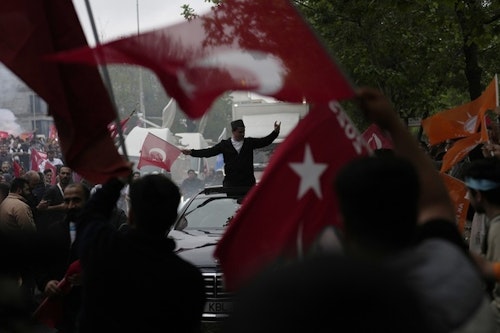
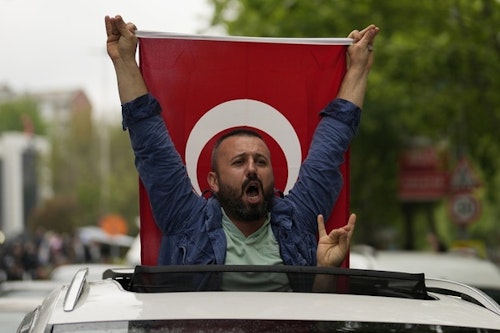
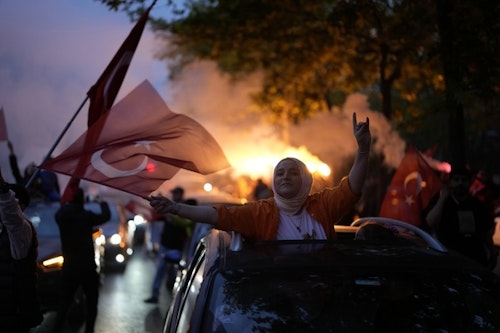
Erdogan claims victory in speech
The Turkish President has claimed he won the election in a speech.
"I would like to thank the citizens who went to the polls and cast their votes. I would like to thank our people for giving us with the responsibility of governing the country for the next five years," he said.
"We will be worthy of your trust."
Just 2% of votes left to count
More than 98% of the ballot boxes have been opened, according to the government-controlled Anadolu Agency news agency.
Erdogan is ahead on 52.1%, meanwhile opposition candidate Kilicdaroglu has 47.9%.
Fifty per cent of the vote is needed for either candidate to win.
Qatar congratulates Erdogan before final results
The Emir of Qatar has congratulated the Turkish President before the official results have been declared.
"My dear brother Recep Tayyip Erdogan congratulations on your victory," wrote Tamim bin Hamad Al Thani on Twitter. "I wish you success in your new term."
Qatar and Turkey have close relations. In 2015, when the Arab League denounced Ankara's air strikes on Kurdish militants in northern Iraq, Doha instead proclaimed its support for Turkey.
Opposition claim they have received half of all votes
The Republican People's Party (CHP), which is facing Erdogan, has said one out of every two votes has been given to their leader Kemal Kilicdaroglu.
“As of now, we seem to have received the votes of one out of every two people,” said CHP spokesman Faik Oztrak.
He made the comment at the party HQ in Ankara, Turkey's capital.
What happens if Erdogan wins?
The Turkish leader is unlikely to amend his domestic and international policy should he remain in power, according to experts speaking to Euronews in May.
Ilke Toygür, professor of European Geopolitics at the University Carlos III of Madrid said a victory could see Erdogan buckle down even more.
"I would even expect the more frightening attitudes when it comes to democracy and when it comes to foreign policy," she told Euronews.
Erdogan has been accused of rolling back Turkey's secular democracy in favour of authoritarian rule during his decades-long tenure.
Political and media freedoms, women's rights and the country's economy have all taken a knock since he took power in 2001.
Meanwhile, Ankara’s relations with NATO allies have soured over the past few years due, in part, to tensions over Turkey’s growing ties with Russia.
Relations with Greece and Cyprus have also reached their worst point in decades under Erdogan.
Final votes being counted
Just over 95% of the ballot boxes have been opened, according to the government-controlled Anadolu Agency news agency.
Erdogan has 52.3% of the vote, while Kemal Kilicdaroglu is on 47.7%.
This equates to 26,000,000 votes for the Turkish president and 23,700,000 for his secular rival.
Opposition polls now put Erdogan ahead
The Turkish president has inched ahead in the opposition polls.
ANKA news agency shows Erdogan is now leading with 50.6% against Kilicdaroglu's 49.4%.
Nearly 90% of the ballot boxes have been opened.
Final result expected soon
Results are coming in thick and fast.
Erdogan is ahead - but only slightly - and the gap is getting slimmer.
The government's Anadolu Agency news agency says the Turkish president has 53% of the vote, with his opponent Kemal Kilicdaroglu on 47%.
The final result from this individual source is expected within the next 30 minutes.
Opposition results differ
In Turkey, there are two main news agencies releasing results on the election, one controlled by the government, the other by the opposition.
The latest unofficial results from the opposition ANKA News Agency but Kilicdaroglu slightly ahead at 50.13%, whereas Erdogan is on 49.87%.
This is in contrast to the government Anadolu Agency news agency puts the Turkish president in the lead.
Crowds gather at Erdogan's home
Large groups of people are massing at the Turkish president's residence in the capital, with votes still being counted.
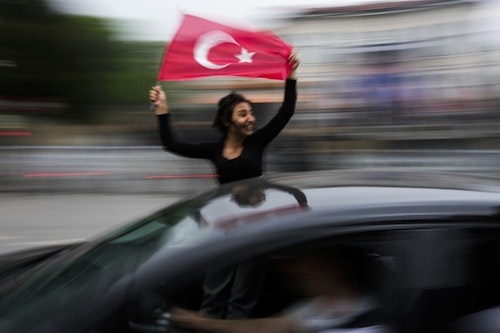
Announcements come at breakneck speed
Some observers have noted the rapid speed at which votes have been announced.
Polls closed at 17:00 local time, with government-controlled media declaring that 66% of the vote had been counted one hour and a half later.
Gap narrows between Erdogan and Kilicdaroglu
The Turkish president has got 55% of the vote, whereas his challenger Kemal Kilicdaroglu is on 45%, according to the state-owned Anadolu Agency news agency.
Just over two-thirds of the ballots have been opened at 66%, with Erdogan strongholds traditionally getting declared first.
The difference in the number of votes between the two political rivals has narrowed slightly.
What did we learn from the first round?
Turkey's election went to a second round because neither candidate secured more than 50% of the vote, as needed under election rules.
But what did we learn from the first round of voting?
1. Erdogan's share of the vote declined
The vote on 14 May was the first presidential election where Erdogan didn't win in the first round. That's already a shock for the Turkish political system. However, he performed much better than expected, with some polls predicting a neck and next race with opposition candidate Kemal Kilicdaroglu.
2. Kurdish supporters did not help the opposition
An alliance of pro-Kurdish parties got 66 seats in the new parliament, enough to make them the third largest bloc. But it wasn't enough for the opposition to outnumber Erdogan.
3. Diaspora voters split country lines
Turkish voters around Europe are highly polarised. More than 5 million people of Turkish descent live in Europe and their votes impacted the results, with each politician having their own regional strongholds.
Early results are in
First results from the second round of the Turkish presidential election show Erdogan on 56%, with secular challenger Kilicdaroglu on 44%, according to Anadolu Agency, state-owned news agency.
That's with just under half of the ballot boxes opened.
Nothing 'negative' affecting the vote, says election authority
No negative situation has been reported at the ballot box, says Ahmet Yener, Chairman of the Supreme Board of Elections.
Speaking after the closure of the polls, Yener said: "There has not been any negative situation reported so far on the voting process."
Who has won - and lost - under Erdogan?
Some parts of Turkish society have benefited under the incumbent's decades-long rule - others haven't.
Here are some of the winners:
The religious
Erdogan is popular among conservative and religious voters, having steered the country away from its secular foundations towards a more Islamist direction.
Real estate
Under Erdogan, real estate and construction have expanded throughout Turkey, stimulating infrastructural growth. Some groups and contractors close to the government have been awarded lucrative government contracts.
Conservative women
Erdogan has defended the rights of conservative Muslims after decades of a resolutely secular regime. Pious women have been gradually allowed to wear headscarves in universities, the civil service, the police and parliament, where they were once de facto banned.
And the losers:
The media
The Turkish media landscape, once held up as an example of pluralism, has become increasingly more restricted under Erdogan. Observers estimate that 90 per cent of the Turkish media are now controlled by the government or its supporters.
The military
The Turkish military, deeply secular and accustomed to coups, has gradually lost its influence on the political scene.
Liberal women
Liberal and feminist women have complained of an increasingly hostile environment under Erdogan, accusing him of rolling back their rights and cracking down on female political groups.
Polls close in Turkey
And that's a wrap. Polls have now closed across Turkey.
We will be here as the results come in through the night and early hours of the morning.
Stay tuned!
Hello, and welcome to Euronews' live blog of the Turkish election.










